Asisiriwa Day 28
5 December 2015
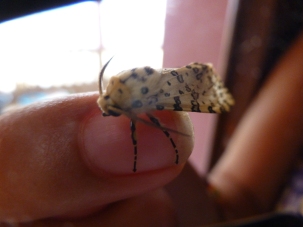
I am becoming acquainted with the movements of insects; the delicate struggle of the spider in its web, the erratic fluttering of moths, the probing curiosity of cockroaches, the scuttling timidity of huntsman spiders on the ceilings and walls, the imperious buzzing of flies. The insects here have become the neighbors and tyrants of my life, demanding my attention while simultaneously accompanying me through the uniquely still chaos of learning how to live simply in a rural mountain village, where the quietness of life is pierced by the sound of drumming, the sound of children calling to each other while fetching water, the frenzied blare of taxis.
It is now nearly a month since we settled in the village, though to me it feels like we’ve been here much longer. In some ways, it feels as if we never left Ghana, and maybe we never did. Maybe even as we traveled, we carried it with us. Perhaps that’s why it seems so utterly familiar now, in that bleary-eyed way of half-dreaming, where the strange and absurd seems perfectly normal, 100% accepted. Calculating my days so as not to use the toilet in the heat of the afternoon when the walls and basin of the toilet are peppered with mosquitoes, washing the dishes in bowls on the verandah, celebrating the cool mornings when I can wear my hair down—these things seem like cornerstones to my life, and yet somewhere I remember how strange they are to me. The jubilation when the power returns after a long, hot day without it—perhaps it is only because it’s shared that this celebration seems so normal. Yet I foresee myself returning to the West with the wide-eyed wonder of suddenly stepping into a future that seemed always just outside of reach.
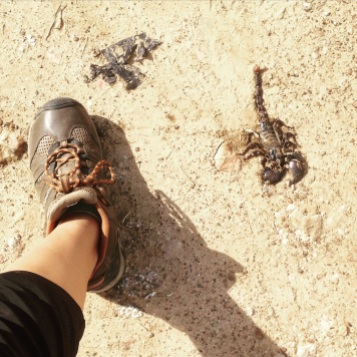
I am beginning to learn of the dangers of living here—the green mambas lurking in the undergrowth promise a swollen death if provoked and if you aren’t able to find treatment within an hour; black cobras have been seen in the cocoa farms; creamy ghost-colored snakes steal chicks and eggs in the night; black and orange scorpions roam the forests twitching and monstrous; so that the ubiquitous and lazy threat of malaria-ridden mosquitoes seems almost a dull drone in the background of this wild place. Of course, even here, humans are still our biggest threat—one corner of the Christ Apostolic Church across the street from the literacy center site lies crumbled in a gaping reminder of the destructive power of taxis.
And yet, even knowing the dangers, I continue to walk to the toilet alone at night, feet clad only in flip flops (which I leave outside for precisely such purposes), with nothing but a flashlight to protect me from the rustling terrors of the night. I continue to tramp loudly through rushes and shrubs. I begin to lose my fear of taxis, hailing them excitedly in the still afternoons, when squeezing four to a back seat or two to a front seat is worth the promise of whipping wind on my sweating face. At these times, the speed is a blessing, and I try not to think of the church corner or the lamb Brady once saw bleating in the street after being struck by a taxi, dying twisted in the dust.
—
Today is another funeral in the village, this time for a teacher named Antwi, and once Brady and Quist return from hiking to Lake Bosomtwe (an excursion I emphatically declined), we will make an appearance to mourn his loss.
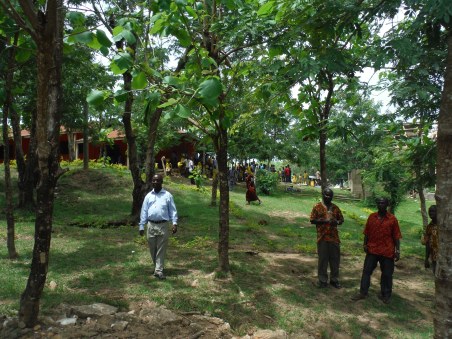
We actually took this picture when we visited the village back in April 2015, which shows (from left to right) Assemblyman Kofi Asante, Prof. Kofi Agyekum, and literacy teacher Opoku Mensah. It wasn’t until after Antwi’s funeral that we noticed him in this picture, peaking out from behind a tree on the right.
We had actually met him when we came to Asisiriwa the first time, back in April, and he seemed perfectly healthy. According to Quist, he suddenly took ill and died quickly, startling the whole village some months ago. It must have been a difficult loss, but it seems that, in Ghana, funerals are not meant for mourning. They are wildly expensive celebrations to which the entire community is invited, and this one seems no different. In fact, very few funeral announcements have made me feel sad. Most feature prominent portraits of the deceased wearing traditional clothing with phrases like “Called to Glory” or “Called Home” emblazoned on them, with long genealogies included, as well as the age of death. Most are in their late 80s, with some breaching 100 before they died. Only one startled me into looking twice: an unambitious pale yellow poster with a portrait of a young girl, hair in long braids, wearing a dress from that fabric fashioned to mimic kente cloth. Above her head the words “Gone Too Soon” floated limply, and her age sat in a circle on her childlike waist—19 years old. Her eyes were smiling; this portrait was not meant to grace a funeral poster. Perhaps it was taken for a graduation announcement, or cropped from an older brother’s wedding. As I was on a tro-tro, I soon passed, but her face full of hope stayed with me, a memento mori I hadn’t sought.
—
There are mice living in the wood pile that has remained in the living room since we’ve been here, housing construction material for Prof’s second house, which is being finished in spurts whenever he comes to Asisiriwa.
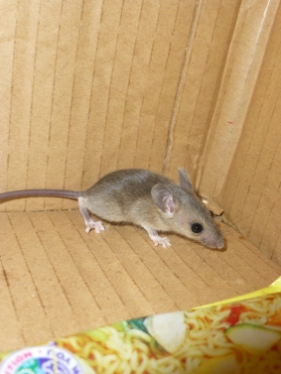
We set up rudimentary traps for them that are indulgently ineffective because we didn’t want to harm them; however, as Quist has advised us, Ghanaian mice are “very stubborn” and will destroy everything, unlike the American mice we’re used to, which he believes are “really cool” and don’t chew through things like clothes or wires or Indomie boxes. We will have to begin taking matters a bit more seriously if they don’t vacate soon. We threw out the bunch of plantains they had been gnawing on (partially to discomfort them, and partially because the plantains had spoiled and begun attracting flies), and with Prof’s arrival have also come construction workers, who have tromped in and begun dismantling the pile, albeit slowly. There is also the matter of them sneaking into our room, which is lined most comfortably with suitcases of books, backpacks full of clothes, and cozy hiking boots, not to mention a full-size bed which provides a significant amount of cover for them if they feel like stretching out.
As someone who hasn’t (knowingly) lived with mice before, it seems an adorable nuisance, though it is possible that they are carrying multitudes of diseases, including rabies—one of the inoculations we didn’t get because it was so expensive. Even knowing this, however, the threat feels vague, as if my entire history of interactions with rodents has taught me not to believe it. It’s a strange feeling. I feel somehow exempt from the dangers of it all, which must be my American upbringing. I’ve always been so distant from real danger that its new proximity still feels unquantifiably distant. And being aware of this makes me feel like I should take extra care not to assume my safety in all situations; caution, though it feels unnecessary, must be the order of the day.
—
It is difficult for me to differentiate between what is real experience and what is simply exposition.
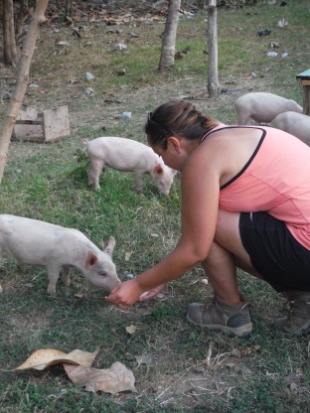
When I read what I’ve written over the past 28 days, so much of it seems merely explanatory—mere setting. Where does the plot begin? Where does the character development start? I suppose I shouldn’t approach journal entries with the analytical eye of a literary critic, but I guess it goes back to my original entry: I am impatient for wisdom. I want to bypass all of the lolling slowness of daily life in order to find something explosive and robust and radical. And yet I decline invitations to climb a mountain in order to lavish these words on myself. Is it out of fear that I stay here to write, or because I am finally getting to know myself and the things that rejuvenate me? I know Brady would say it’s fear that makes me stay, but I’m beginning to think he isn’t the final authority on what I think or feel or do. My reasons, like myself, are complex and multifaceted, and perhaps defining my decision to do things other than what he would like me to do as simply “fear” or “disinterest” is reductive. In fact, I know it is.
If this is what I’ve come to Ghana to learn—how to be a truer version of myself—then I suppose I must be satisfied with its smallness. Although the more I consider it, it doesn’t seem small. I feel myself slowly becoming larger, becoming a woman nurtured, though I still have far to go. Yet how do I quantify the success of an experience wherein the benefit is something so intimate? Do I need to?








